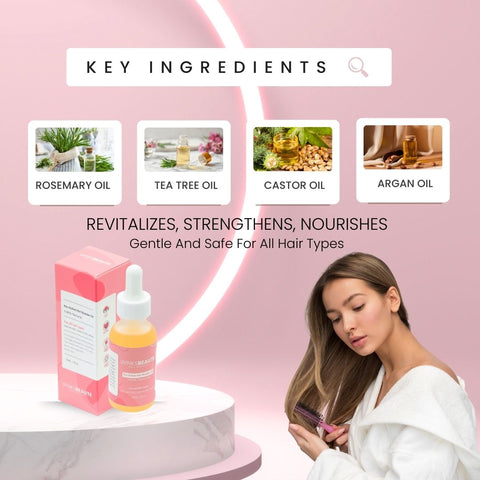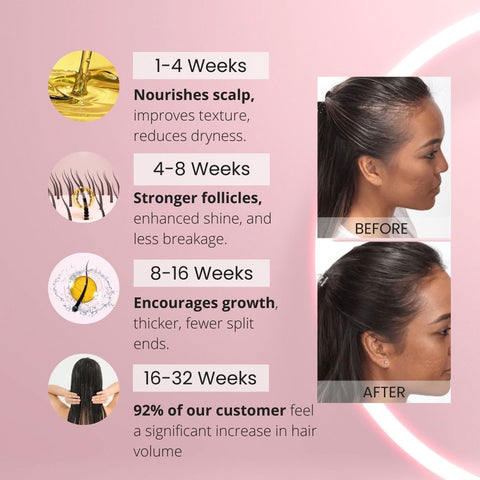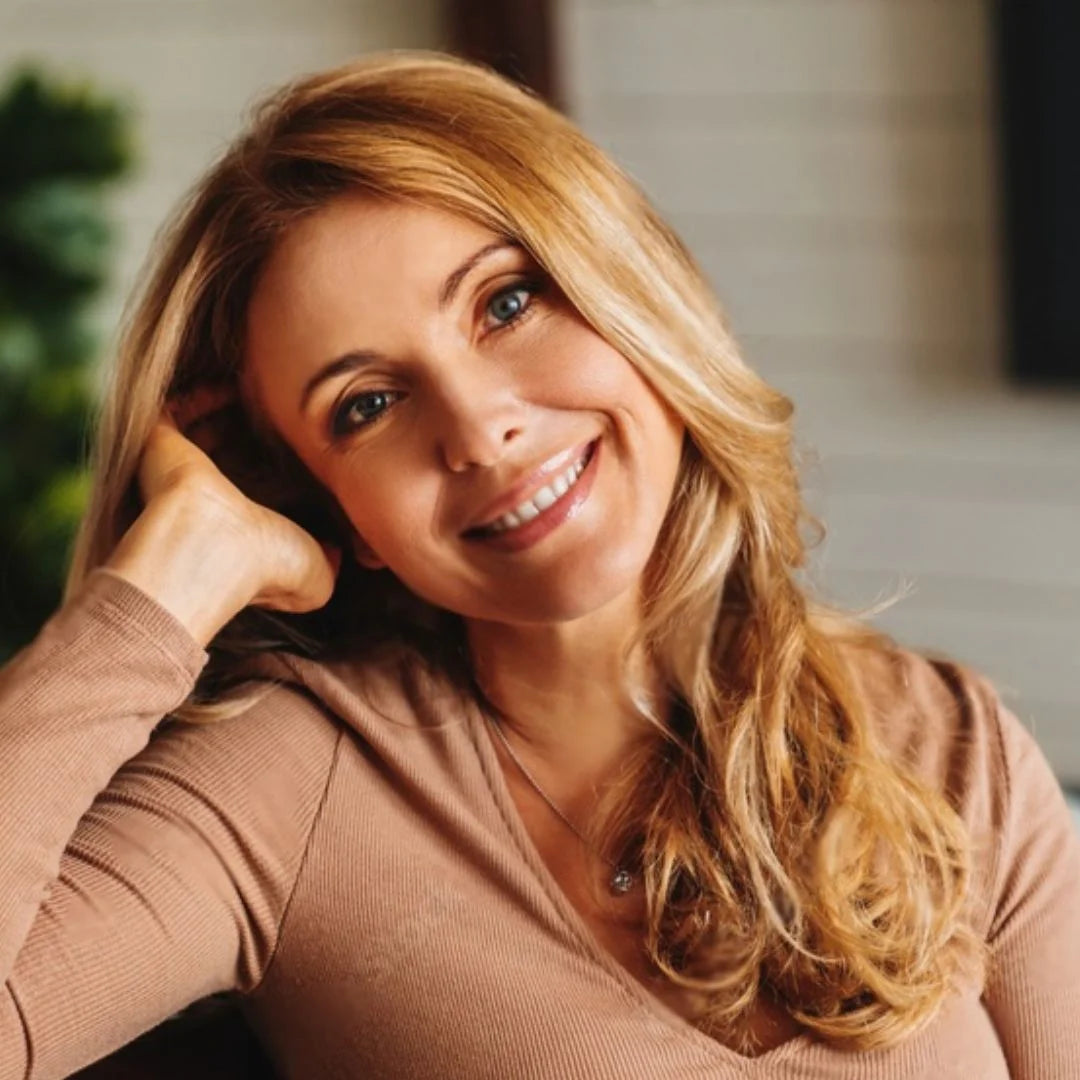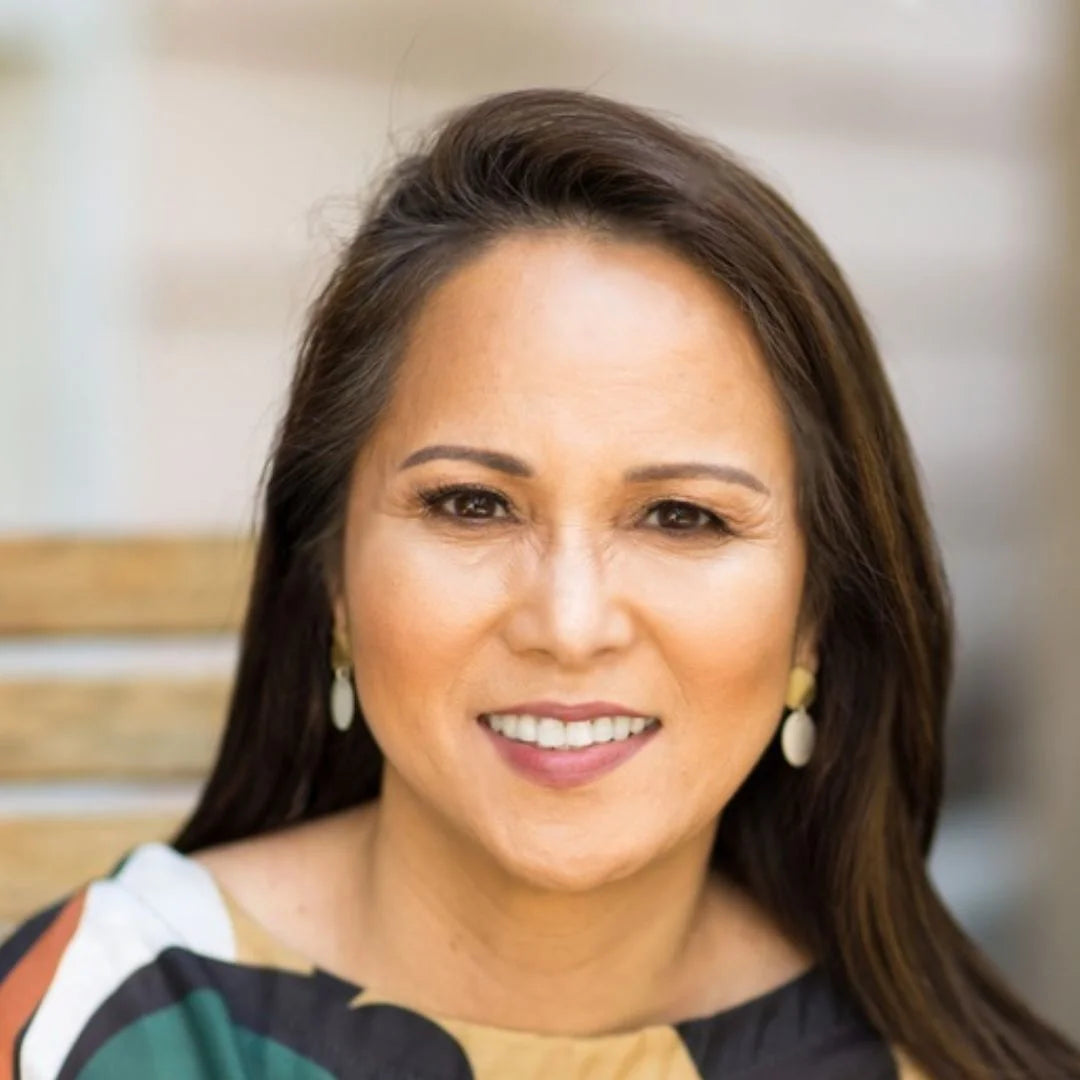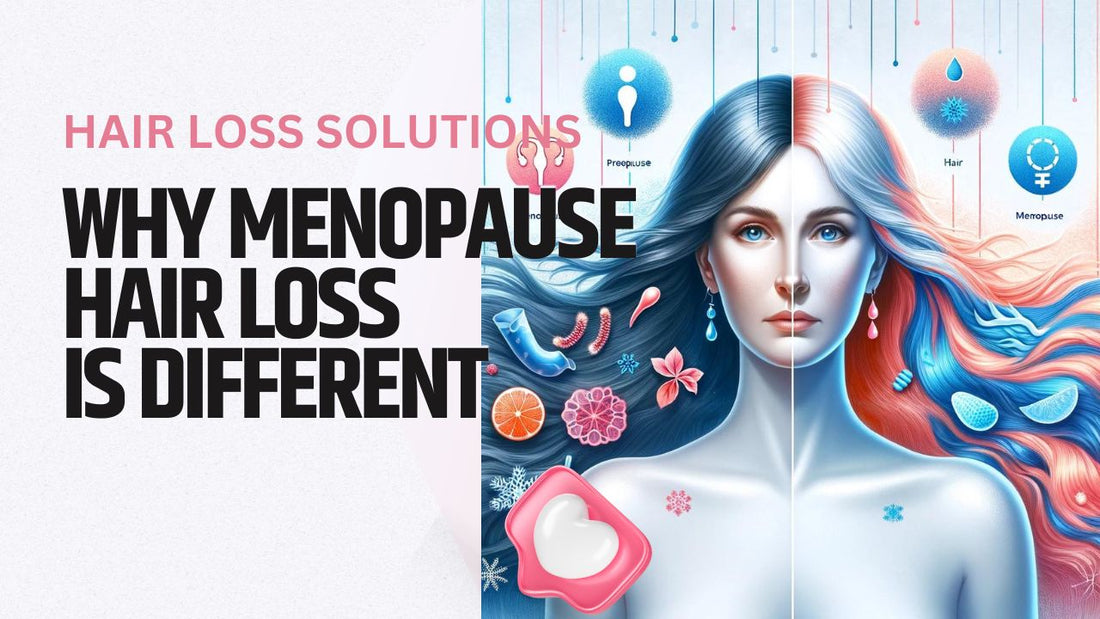
Why Menopause Hair Loss Is Different
Share
While hair loss can occur at any stage of life, the hair changes experienced during menopause are unique and often more profound than those associated with other life events. Menopausal hair loss is a complex phenomenon that goes beyond the typical shedding or thinning, and understanding its distinct characteristics is crucial for effective management and coping. In this article, we'll delve into the underlying factors that set menopausal hair loss apart, explore its emotional impact, and provide insights into how to navigate this journey with resilience and self-love.
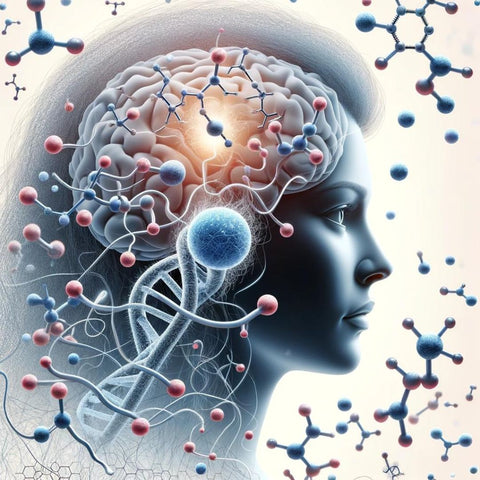
Hormonal Factors in Menopausal Hair Loss
Estrogen Decline
One of the primary drivers of menopausal hair loss is the decline in estrogen levels. Estrogen plays a vital role in regulating the hair growth cycle, promoting the anagen (growth) phase and prolonging the lifespan of hair follicles.
As estrogen levels drop during menopause, the anagen phase shortens, leading to increased shedding and a longer telogen (resting) phase, where hair stops growing. This disruption in the hair growth cycle can result in noticeable thinning and a reduction in hair volume and density.
Androgen Increase
While estrogen levels decline during menopause, there is often a relative increase in androgen levels. Androgens, or male hormones, are present in both men and women, but an imbalance can contribute to a condition known as androgenic alopecia or female pattern hair loss.
Menopausal women may experience increased sensitivity to androgens, leading to hair thinning and shedding, particularly in the frontal and parietal regions of the scalp. This type of hair loss is characterized by a widening of the part line and a gradual recession of the hairline.
Thyroid Hormone Imbalances
Another hormonal factor that can contribute to menopausal hair loss is thyroid hormone imbalances. Hypothyroidism, a condition characterized by an underactive thyroid gland, is known to cause hair thinning and excessive shedding.
During menopause, changes in thyroid function can occur, leading to fluctuations in thyroid hormone levels. These imbalances can further exacerbate hair loss and make it more challenging to manage.
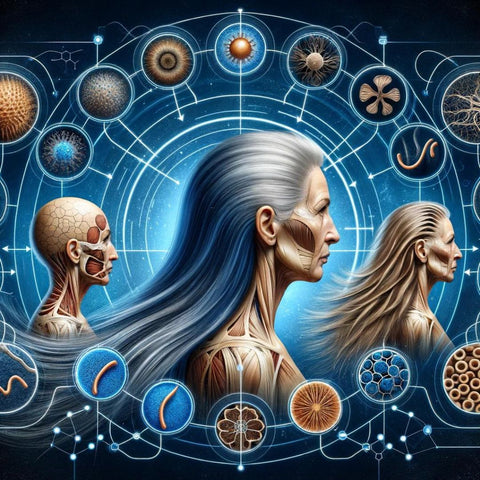
Physiological Changes and Hair Loss
Age-Related Factors
While menopause is primarily driven by hormonal shifts, the natural aging process itself can also play a role in menopausal hair loss. As we grow older, the hair follicles can weaken, leading to a shorter growth cycle and finer, more delicate strands.
Additionally, the natural process of graying occurs as melanin production decreases, which can contribute to a perceived thinning of hair due to the change in hair texture and appearance.
Nutritional Deficiencies
Menopausal women may be more susceptible to nutritional deficiencies, which can further compound hair loss issues. Essential nutrients like protein, iron, zinc, and biotin are crucial for healthy hair growth, and a lack of these nutrients can lead to thinning and shedding.
Furthermore, as we age, our bodies may have difficulty absorbing and utilizing certain nutrients effectively, making it more challenging to maintain optimal hair health through diet alone.

Emotional and Psychological Impact
Self-Esteem and Body Image
Hair is often deeply intertwined with a woman's sense of self-esteem and body image. It is not only a symbol of femininity and youth but also a reflection of personal style and identity. As such, the hair changes experienced during menopause can have a profound emotional impact.
For many women, the gradual thinning and shedding of hair can be a confronting and distressing experience, challenging their self-confidence and perception of beauty. This can be particularly difficult in a society that places a high value on youthful appearance and a full head of hair.
Stress and Anxiety
The emotional distress caused by menopausal hair loss can create a vicious cycle, as stress and anxiety are known to exacerbate hair shedding further. Elevated levels of stress hormones, such as cortisol, can disrupt the hair growth cycle and contribute to excessive hair loss.
Managing stress and finding healthy coping mechanisms becomes crucial during this time, not only for emotional well-being but also for mitigating the negative impact of stress on hair health.
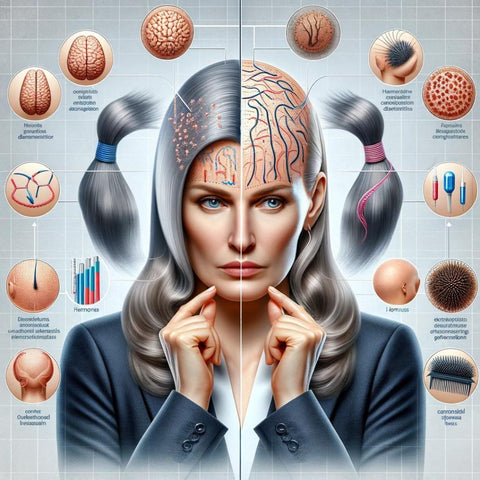
Distinguishing Menopausal Hair Loss from Other Types
While hair loss is a common concern, it's important to distinguish menopausal hair loss from other types to develop an effective management strategy.
Diffuse Thinning vs. Patterned Hair Loss
Menopausal hair loss often presents as a diffuse or generalized thinning across the scalp, rather than a specific pattern of shedding. This contrasts with male pattern baldness or androgenic alopecia, which typically exhibits a characteristic horseshoe pattern of hair loss.
Excessive Shedding vs. Gradual Thinning
Another distinguishing factor is the rate of hair loss. Menopausal hair loss can sometimes involve excessive shedding, where large amounts of hair are lost in a relatively short period. However, it can also manifest as a gradual thinning over time, making it subtler and more challenging to detect initially.
Temporary vs. Permanent Hair Loss
In many cases, menopausal hair loss is a temporary condition that can be managed and potentially reversed with appropriate treatment and lifestyle changes. However, in some instances, the hair loss may be more permanent, particularly if left unaddressed or if there are underlying medical conditions contributing to the problem.
Proactive Rosemary Hair Booster Oil: A Comprehensive Solution
Key Ingredients and Their Benefits
Introducing Proactive Rosemary Hair Booster Oil – a powerful and nourishing solution designed to combat menopausal hair loss and promote healthy hair growth. This innovative formula combines the potent properties of rosemary oil with other nourishing oils and extracts:
- Rosemary Oil: Rich in antioxidants and anti-inflammatory compounds, rosemary oil has been proven to promote hair growth, increase hair thickness, and improve scalp health.
- Grape Seed Oil: Packed with vitamin E and essential fatty acids, grape seed oil nourishes the scalp and strengthens hair strands, preventing breakage and promoting volume.
- Castor Oil: Known for its ability to improve blood circulation, castor oil can deliver essential nutrients to the hair follicles, promoting healthy growth and volume.
- Tea Tree Oil: Renowned for its antimicrobial and antiseptic properties, tea tree oil helps maintain a healthy scalp environment, which is essential for voluminous hair growth.
How to Use Proactive Rosemary Hair Booster Oil
Incorporating Proactive Rosemary Hair Booster Oil into your hair care routine is simple and effective. Gently massage the oil onto your scalp, focusing on the areas of thinning or excessive shedding. This method not only nourishes the scalp but also stimulates blood circulation, delivering essential nutrients to the hair follicles.
For added benefits, you can also apply the oil to the lengths of your hair, paying special attention to the ends, which are often prone to dryness and breakage.
Combining with Other Treatments
Proactive Rosemary Hair Booster Oil can be used in conjunction with other treatments for menopausal hair loss, creating a comprehensive and multi-faceted approach to address the various contributing factors.

Managing Menopause Hair Loss: A Multifaceted Approach
Hormone Replacement Therapy (HRT)
For women experiencing severe or persistent hair loss due to hormonal imbalances, hormone replacement therapy (HRT) may be an option. HRT involves supplementing the body with estrogen and progesterone to help restore hormonal balance and alleviate menopausal symptoms, including hair loss.
It's important to note that HRT is a medical treatment and should only be undertaken under the guidance of a healthcare professional, as it carries potential risks and benefits that need to be carefully evaluated.
Nutritional Supplementation
Addressing nutritional deficiencies can play a crucial role in managing menopausal hair loss. In addition to optimizing your diet with nutrient-rich foods, targeted hair growth supplements can provide a concentrated dose of essential vitamins, minerals, and nutrients.
Look for supplements containing biotin, iron, zinc, vitamin C, and other key ingredients that support healthy hair growth and follicle health. Consulting with a healthcare professional or a qualified nutritionist can help ensure you're taking the appropriate supplements for your specific needs.
Stress Reduction and Self-Care
Incorporating stress reduction and self-care practices into your routine can have a profound impact on managing menopausal hair loss. Mindfulness practices, such as meditation, deep breathing exercises, and yoga, can help reduce stress levels and promote a sense of calm and well-being.
Additionally, seeking support from loved ones, joining support groups, or engaging in counseling can provide a safe space to process the emotional challenges of menopause and hair loss. Remember, taking care of your mental and emotional health is just as important as addressing the physical aspects of hair loss.
Effectively managing menopausal hair loss often requires a multi-pronged approach that addresses the various contributing factors. By combining targeted treatments, lifestyle changes, and self-care practices, you can increase your chances of achieving optimal results and regaining the confidence that comes with healthy, vibrant hair.

Embracing the Journey with Resilience and Self-Love
While navigating the complexities of menopausal hair loss can be challenging, it's important to remember that this journey is a natural part of the aging process and a testament to the strength and resilience of women. Embrace this transition with self-love and self-acceptance, and surround yourself with a supportive community that celebrates your beauty, both inside and out.
Redefining Beauty Standards
Societal standards of beauty often place an unrealistic emphasis on youthful appearance and a full head of hair. However, true beauty transcends these narrow definitions and encompasses the unique experiences and wisdom that come with each stage of life.
Embrace the opportunity to redefine beauty on your own terms, celebrating the strength and grace that come with navigating the challenges of menopause.
Cultivating Self-Acceptance
Self-acceptance is a powerful tool in coping with the physical changes associated with menopause. Rather than viewing hair loss as a loss of femininity or a source of shame, approach it with curiosity and compassion for the incredible journey your body is undertaking.
Celebrate the parts of yourself that remain constant – your intelligence, your kindness, your resilience – and recognize that your self-worth extends far beyond your physical appearance.
Finding Strength in Community and Support
Remember, you are not alone in this journey. Seek out communities of women who understand the challenges of menopausal hair loss and can offer support, encouragement, and shared experiences.
Whether it's joining online forums, attending support groups, or simply opening up to trusted friends and family members, embracing a sense of community can provide a powerful source of strength and validation during this transformative phase of life.
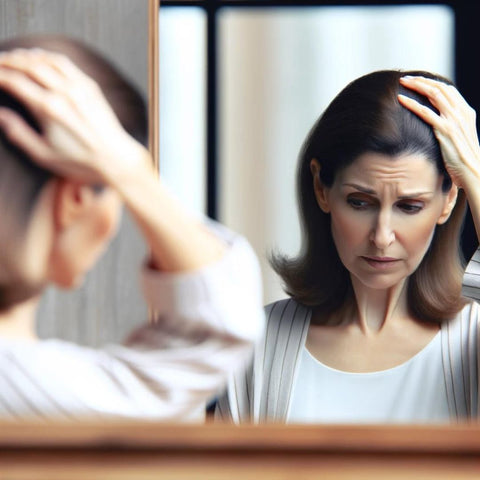
Conclusion: Embracing the Unique Journey of Menopause Hair Loss
Menopausal hair loss is a multifaceted experience that extends beyond the physical aspect of thinning hair. It is a journey that encompasses hormonal shifts, physiological changes, emotional challenges, and societal perceptions of beauty and aging. By understanding the unique factors that set menopausal hair loss apart, you can approach it with a more informed and comprehensive perspective.
Remember, while hair loss during menopause can be distressing, it is a normal and natural part of the aging process. Embrace this journey with resilience, self-love, and a willingness to redefine beauty on your own terms. Seek support from loved ones, healthcare professionals, and communities of women who understand the complexities of this experience.
Incorporate solutions like Proactive Rosemary Hair Booster Oil, a powerful blend of nourishing ingredients designed to support hair growth and scalp health during this transitional phase. Remember, managing menopausal hair loss often requires a multifaceted approach that combines targeted treatments, lifestyle changes, and self-care practices.
Above all, trust in your inner strength and celebrate the wisdom and grace that come with navigating the unique challenges of menopause. Your journey is a testament to the remarkable resilience of the female spirit, and by embracing it with self-love and acceptance, you can emerge even more beautiful, confident, and empowered.
FAQ Section
Is menopause hair loss permanent or temporary?
In most cases, menopausal hair loss is a temporary condition that can be managed and potentially reversed with appropriate treatment and lifestyle changes. However, in some instances, the hair loss may be more permanent, particularly if left unaddressed or if there are underlying medical conditions contributing to the problem.
How does menopausal hair loss differ from typical hair shedding or thinning?
Menopausal hair loss is often more profound and complex than typical hair shedding or thinning. A combination of hormonal imbalances, physiological changes, and emotional factors unique to the menopausal transition drives it. Additionally, menopausal hair loss can manifest as diffuse thinning across the scalp or excessive shedding, rather than a specific pattern of hair loss.
Can hormone replacement therapy (HRT) help with menopausal hair loss?
Yes, hormone replacement therapy (HRT) can be an effective treatment for menopausal hair loss caused by hormonal imbalances. HRT involves supplementing the body with estrogen and progesterone to help restore hormonal balance and alleviate menopausal symptoms, including hair loss. However, HRT is a medical treatment and should only be undertaken under the guidance of a healthcare professional.
How long does it take to see results from using Proactive Rosemary Hair Booster Oil?
The timeline for seeing results with Proactive Rosemary Hair Booster Oil can vary from person to person. However, many users report noticing improvements in hair growth, thickness, and overall hair health within a few weeks to a few months of consistent use. It's important to be patient and consistent with the application.
Can stress and emotional factors exacerbate menopausal hair loss?
Yes, stress and emotional factors can play a significant role in exacerbating menopausal hair loss. Elevated levels of stress hormones, such as cortisol, can disrupt the hair growth cycle and contribute to excessive hair shedding. Additionally, the emotional distress caused by hair loss can create a vicious cycle, further compounding the problem. Managing stress and prioritizing self-care practices are crucial components of a comprehensive approach to managing menopausal hair loss.

